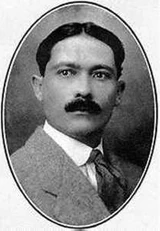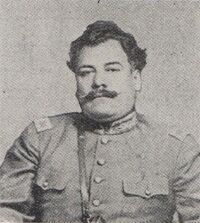
U.M.P. candidate Pedro Fuentes.
The 1926 Mexican elections took place in April 1926 for the purpose of choosing the President and Congress of the United States of Mexico. It resulted in the defeat of incumbent President Emiliano Calles of the Liberty Party by the United Mexican Party candidate, Assemblyman Pedro Fuentes of Chiapas.
The election was a referendum on Calles' presidency, and in particular on Calles' Manumission Act, which freed Mexico's 103,000 Negro slaves. Calles was elected in 1920, at the height of the national crisis over the institution of Negro slavery. Assisted by Secretary of State Albert Ullman and Douglas Benedict, the President of Kramer Associates, the world's largest corporation, Calles had been able to force the Manumission Act through the Mexican Congress in May 1920. The opposition to the Manumission Act was led by Fuentes, who denounced members of his own party who had run against the abolition of slavery but now supported the Manumission Act because their campaign finances depended on major donations from K.A.

Liberty Party candidate Emiliano Calles.
Calles' promotion of the Manumission Act, and his subsequent campaign to gain statehood for Mexico's subject territories, eliminated his support in Congress and made it nearly certain that he would be defeated if he attempted to run for re-election. Nevertheless, the likelihood that Fuentes would receive the U.M.P. nomination and seek to repeal the Manumission Act as president prompted Calles to seek another term. Although there was some minor opposition at the Liberty Party's national convention in December 1925, Calles received the party's nomination.
As expected, Fuentes' popularity among the rank and file of the U.M.P., who continued to vehemently oppose manumission, ensured that he would receive the presidential nomination at the party's national convention. In his acceptance speech, Fuentes pledged that during the upcoming campaign he would "explore every avenue, every facet of the Calles record, and expose this man for the fraud he is."
In the early days of the campaign, Calles denounced Fuentes as a "would-be tyrant," while Fuentes dismissed Calles as "a failure, simple and complete." The two candidates held a vitavised debate on 5 January 1926, but the expected fireworks between them were missing, with both candidates speaking more guardedly. The campaign's turning point came on 10 January, when Fuentes gave a speech in Tampico in which he said that he considered both the slavery and statehood issues closed. Once he was certain that Fuentes would not seek to overturn the Manumission Act, Calles lost interest in the campaign. From that point on, the campaign was dull, with neither candidate giving a major speech.
As expected, Fuentes won the election easily, gaining 53% of the national vote and majorities in every state but Arizona.
| State | Calles votes | Calles % | Fuentes votes | Fuentes % | Total votes |
|---|---|---|---|---|---|
| Alaska | 385,697 | 45.8 | 456,354 | 54.2 | 842,051 |
| Arizona | 1,546,807 | 60.6 | 1,006,598 | 39.4 | 2,553,405 |
| California | 3,330,406 | 49.9 | 3,343,493 | 50.1 | 6,673,899 |
| Chiapas | 1,243,587 | 40.8 | 1,802,346 | 59.2 | 3,045,933 |
| Durango | 1,545,695 | 37.3 | 2,599,989 | 62.7 | 4,145,684 |
| Hawaii | 399,796 | 44.6 | 495,695 | 55.4 | 895,491 |
| Jefferson | 2,879,455 | 48.5 | 3,056,406 | 51.5 | 5,935,861 |
| Mexico del Norte | 945,334 | 48.6 | 1,000,059 | 51.4 | 1,945,393 |
| U.S.M. | 12,276,777 | 47.1 | 13,760,940 | 52.9 | 26,037,717 |
Despite his long history of opposition to manumission, once he took office, Fuentes took little interest in the freed slaves. The Manumission Bureau continued its work, and even saw its appropriation increased in 1928. Instead, Fuentes turned his attention on Kramer Associates, which he had come to detest and intended to bring to heel.
Sobel's source for the 1926 Mexican elections was Winston Clark's The Calles-Fuentes Campaign of 1926 (Mexico City, 1945). Election results are from the U.S.M. Statistical Abstract, p. 114.
| U.S.M. National Elections |
|---|
| 1821 • 1827 • 1833 • 1839 • 1845 • 1851 • 1857 • 1863 • 1869 • 1875 • 1881 • 1902 • 1908 • 1914 • 1920 • 1926 • 1932 • 1938 • 1944 • 1950 • 1965 |
